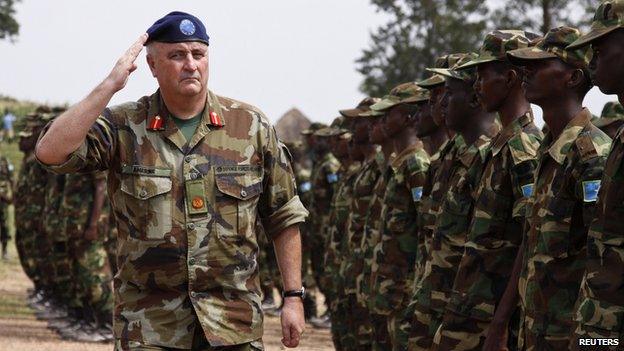EU to boost joint military projects
- Published

The EU has funded training of Somali troops in Uganda
EU leaders say the 28-nation bloc's defence capabilities must be improved, to make military deployments more rapid and effective.
In a joint statement , externalin Brussels they called for the development of drones and air-to-air refuelling planes.
Earlier, UK Prime Minister David Cameron warned against attempts to give the EU - rather than Nato - a bigger role in co-ordinating defence policy.
It is the first EU summit for five years to examine defence policy.
Nato chief Anders Fogh Rasmussen, who attended the talks, said military operations had also shown a need for more European heavy transport planes.
He played down differences between EU and Nato plans, saying: "I don't see any contradiction between strengthened defence in Europe and a stronger Nato."
But he added: "We're not talking about the EU possessing capabilities; there is a need for nations to do more to acquire much-needed military capabilities".
UK pushes Nato role
The UK sought to emphasise the primacy of Nato and nation states, and worked to include more references to Nato in the summit's conclusions.
"It makes sense for nation states to co-operate over matters of defence to keep us all safer... but it is not right for the EU to have capabilities, armies, air forces and the rest of it," Mr Cameron said.
The European Commission says there are about 400,000 defence industry jobs in the EU, but criticises the amount of duplication , externalin the member states' armed forces.
The joint statement called for improvements in the EU's rapid reaction capability, including the development of joint "EU battle groups" which could intervene in conflict zones.
For the past 10 years the EU has had two battalion-strength units training together, but they have never been deployed in a conflict.
France has deployed 1,600 troops in the war-torn Central African Republic, in an effort to halt fighting between rival Christian and Muslim militants in which many civilians have died.
At the summit France called for joint EU funding to pay for future interventions like France's in the CAR and, earlier this year, in Mali. However, that plea was not reflected in the leaders' conclusions.
- Published19 December 2013
- Published23 March 2012
- Published20 December 2013